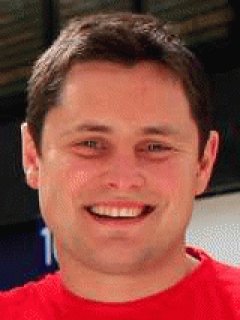It's a healthy get-up-and-go breakfast, made up of oats, yogurt and fruit.
How did you hit on it?
I was working in the City at the time, but really wanted to set my own business up. I thought there was a huge gap in the market for healthy breakfasts for people on the go in the morning. My aim was to give people something really healthy, which filled them up and tasted delicious. We started trading from a converted branded filing cabinet on wheels in Waterloo Station, in February 2006.
What drives you?
I've always wanted to do my own thing. Now I am, I love being my own boss, the fact that we've got a great team and a genuinely fantastic product. It's very easy to get passionate about a product when it's so good. That's really important. Two things drive me: a will to succeed and make it successful from a personal point of view (and for the team, because they are as passionate about Moma as I am). The other is a belief in the product that gets you through the ups and downs.
Is it your first stab at entrepreneurism?
I'm a farmer's son, and used to work on the farm, but I don't think I ever had my own business or anything as a child.
Were your parents astonished when you set up your own?
We're quite an entrepreneurial family and, although it's a farming business, my father and brothers are all their own bosses and quite forward thinking and dynamic in terms of the industry and their work. So no, they weren't surprised. We are creating a completely new category of product in the marketplace, so it is quite a big undertaking, and probably a much bigger task than I realised at the time. But they know I enjoy it and I get a lot of support from them.
How tough is it to define brand essence?
It's really tough, because I'm not from a natural branding background. I approached Moma more from a business point of view, with the drive to create a great business. When you work with people on branding you get lots of different opinions and it is really hard sometimes to get clarity on what you're after. Often I've found that the best ideas are the simplest ones.
So has that altered the way you think about branding consultants?
Yes definitely. I'm very sceptical and cautious, but when I find somebody who is good I value their input. There are so many different opinions out there that, if you discover someone knowledgeable who also talks a lot of sense — and gets your brand — then you need to stay close to them.
How easy is it to define your consumer?
When we started out our target was clear: a London office commuter on their way to work. But as the business has evolved so has our approach to the market: we're not just after those original commuters, but also people flying on planes and mums doing their weekly shop. We also probably don't define it as narrowly as other companies would.
Presumably it is no longer London-based?
We are national, but the vast majority of sales are London-based.
How do you achieve cut-though?
We are unique. No other breakfast product delivers across a range of qualities that are important to people first thing in the morning: healthy, delicious, natural. We're the only company to tick all those boxes.
If you had your time again, and unlimited funds, what specific things would you like to learn from research?
I would like to know a lot more depth around people's eating habits, what's important to them when they're eating breakfast at home, and the relative importance of factors like price, health, etc. I'd also be interested in what's important to them outside of the home. That would then feed into how we targeted our marketing, involving everything from messages on pack and pack format to sampling, and what we ought to target through PR, those sorts of things.
How do you prefer to listen to consumers?
Our main source of feedback is from people on the stalls, who write up their stall sheets and feed them back to the office daily. We also get a lot of feedback from emails, both good and bad, all of which is extremely useful. We use Facebook and Twitter, but get more interaction from Facebook.
Why do you reckon this is?
If we were after broad information, we'd probably go for Facebook. With Twitter you're more likely to get people following you because they're genuinely interested, and more from a business angle — albeit their business might be in branding, or marketing, or something similar.
BlackBerry or iPhone?
iPhone. I think it's more fun and you can do a lot more with it than the BlackBerry.
Main challenges for a small business?
Apart from staying afloat? Getting information about what your product is and the messages you want to convey out there clearly, concisely and to the right people.
Where does inspiration come from?
I'm not looking for inspirational new ideas but at ways to get our idea into people's minds. My inspiration comes from chatting with our team, or others in the industry about what we could do.
What's the role of innovation in your business?
Innovation is key for business, but we're currently working with an innovative business. It doesn't mean we're resting on our laurels, but we're not looking for the next big thing.
Dress code at work?
Casual, on brand. I normally wear jeans and a Moma T-Shirt that says "Get your oats" on the front, and if I'm off to a business meeting I put a jacket on top.
Branson or Murdoch?
Branson one hundred percent. He has the passion and the balls that we aspire to in our brand in terms of confidence, fun and determination.


